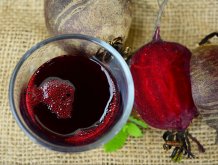
A new study investigates the impact of beetroot juice in later life.
Can beetroot juice help keep our brains sharp in later life? New study investigates
An innovative clinical trial will investigate how drinking beetroot juice impacts brain function in older adults, via the bacteria that live in our mouths.
A donation from University of Exeter alumnus Tom Morgan (Business Economics 1999) is supporting the new research. It seeks to investigate how the hundreds of species of bacteria and other organisms that colonise our mouths – known as the oral microbiome - impact on processes key to the development of major diseases, including brain diseases such as Alzheimer’s disease and other dementias.
Beetroot juice is high in dietary nitrate, which our oral microbiome processes and turns into nitric oxide, a molecule which plays a key role in transmitting information between cells and regulating blood vessels.
Older people tend to have lower nitric oxide production, and this is associated with poorer vascular (blood vessel) and cognitive (brain) health. Diets rich in vegetables and leafy greens contain dietary nitrate – but few adults eat sufficient amounts. Previous Exeter research has found that drinking beetroot juice alters the oral microbiome, indicating higher levels of nitric oxide, meaning less risk of disease and inflammation.
Professor Anni Vanhatalo, Professor of Human Physiology at the University of Exeter, is one of the lead academics on the new study. She said: “The oral microbiome is increasingly being recognised as an exciting avenue for cognitive health research.
“The University of Exeter has led the way on previous research which suggests that dietary nitrate, which is found in beetroot juice, may enhance brain function. Our clinical trial is needed to see if we can confirm these findings in older people. This project has a really exciting potential to impact early detection of dementia risk. In future, it could lead to the introduction of individualised diets which aim to stimulate the oral microbiome in ways that could prevent or delay cognitive decline in older age.”
The new trial will be delivered through the PROTECT online platform. 60 participants will be recruited from PROTECT. Half will be sent beetroot juice supplements and the other half will receive a specially produced beetroot juice with the dietary nitrate removed, to act as a placebo for research. All participants will undertake cognitive tests at the beginning and end of a 12-week period on the PROTECT platform, as well as providing saliva samples to detect any changes in their oral microbiome.
Dr Anne Corbett, Senior Lecturer in Dementia Research at the University of Exeter Medical School, leads the PROTECT platform. She says: “PROTECT hosts more than 25,000 people over 40 years of age through a digital platform, which is custom-made to support trials like this. The cohort is fully characterised with cognitive and health data so it is possible to recruit directly from our pool of participants.
“This means PROTECT offers an ideal platform for testing the efficacy of a dietary nitrate supplement because it allows fast, efficient trial delivery at a fraction of the cost of a traditional trial. This study has the potential to deliver ground-breaking insight into the value of dietary supplementation on cognitive health and dementia risk.
“We’re still open for recruitment, and we’re now open for people aged 40 and over to sign up. Join us, and you could help us discover how to keep the brain sharp for longer.”
More than 25,000 people aged over 40 have signed up to PROTECT, an innovative online study of which aims to explore how cognition changes over time by asking people to complete annual tests of their memory, reasoning and attention. The study is led by the University of Exeter and the Institute of Psychiatry, Psychology & Neuroscience (IoPPN) at King’s College London, and funded by National Institute for Health Research (NIHR) Maudsley Biomedical Research Centre.
To find out more about the study, visit https://www.protectstudy.org.uk/
Date: 1 February 2022
